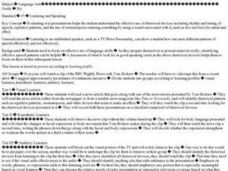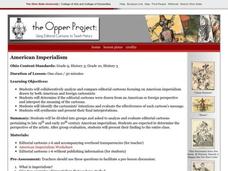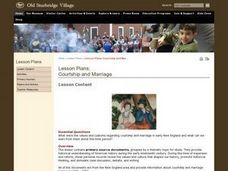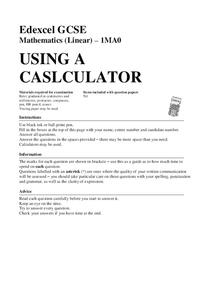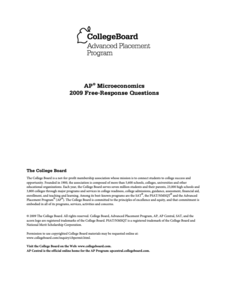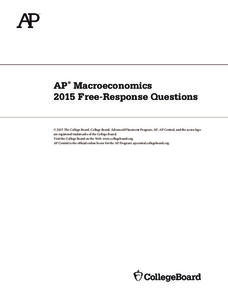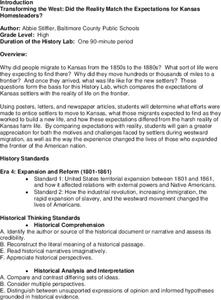Cuba Lecture I: Pre-History to 1952 (2016)
Cuba: War and Peace Unit I PowerPoint presentation which informs students of the key geopolitical, historical, social and internal dynamics of U.S-Cuba relations, Pre-history to 1935. Learners evaluate the role of geography,...
Cuba War and Peace: Essential Questions (2016)
Students (grades 8-12+) will understand the key geopolitical, historical, social and internal dynamics of U.S-Cuba relations, 1895-present. Learners evaluate the role of geography, imperialism, slavery, island ethnicity, resources and...
Cuba War and Peace: Lecture I Pre-History to 1952
Students will understand the key geopolitical, historical, social and internal dynamics of U.S-Cuba relations, Pre-history to 1952. Learners evaluate the role of geography, imperialism, slavery, island ethnicity, resources and power,...
Curated OER
Yeast Bread: Final Evaluation Project
Identify and prepare yeast breads. National Standard 14.3.3 Identify the classes of breads: rolls, loaves, deep-fat fried Identify ingredients in yeast breads and their functions: flour, yeast, liquid, salt, sugar, fat and eggs Identify...
Curated OER
The Need to Evaluate
Students access 3 Internet sites. They examine the need to question information found on the Internet and research a question using the Internet. They study discrepancies among Web sites and brainstorm indicators that determine a Web...
Curated OER
Evaluating Oral Presentation
Sixth graders examine the use of rhetorical devices in oral presentations. In this rhetorical device lesson, 6th graders watch a newscast of a major TV news personality to observe how speech patterns and rhythms are used effectively....
Curated OER
American Imperialism
Critical analysis skills can be built in a variety of ways. Using editorial cartoons (both domestic and foreign) learners will consider how American Imperialism was perceived during the late 19th century. Critical thinking questions,...
Curated OER
Find The Hidden Message: Media Literacy in Primary Grades
Learners practice listening to and reading various types of media and text. In groups, learners use video, newspapers, magazines, and more to compare and contrast different types of information. They identify the differences between fact...
Curated OER
Courtship and Marriage
Students research the concept of courtship and marriage as it pertains to early New England and explore the values and culture that shaped our history. In this courtship and marriage lesson, students examine primary source documents that...
Curated OER
Communities in Crisis Lesson 1: Primary Source? What is That?
Distinguish between primary and secondary source documents using the theme of philanthropy. Middle schoolers discuss Anne Frank: The Diary of Young Girl as a way to study the past using a primary source. Then they investigate how to...
Curated OER
Encouraging Answers
What is the celebration of Columbus Day really about? Older learners use inquiry-based methods to find out who Columbus really was and what motivated his journeys. They take on the roles of town officials who must consider whether or not...
Curated OER
Sexual Health and Hygiene
By examining harmful health and hygiene practices, teens will be able to determine what is best for their body. Advertisers for health/hygiene products will also be evaluated for "best interest" criteria. The class will begin by...
Curated OER
What Do You Think? Analyzing Points of View About an Issue
"How might multiple perspectives of standardized testing impact me as a student?" is an example of an essential question that a researcher might use as a basis for this lesson on how to research and present a written stance on a...
Curated OER
"All Together Now" by Barbara Jordan
Cover the topic of race relations with these questions that go with Barbara Jordan's persuasive speech "All Together Now." These reading questions ask readers to think about her speech in a variety of ways by analyzing particular words...
Polk Bros Foundation
Contrast Points of View
Compare two positions on the same topic and assess the positions for logical argument with a basic instructional activity. Pupils fill in information about each position, note down which position is more logical, and compose a few...
Mathed Up!
Using a Calculator
Here's a video that presents several numerical expressions to be evaluated using a calculator.Viewers come to realize that sometimes it is not just a matter of punching in the numbers, but they also need to be concerned about how the...
CK-12 Foundation
Tangent Line Approximation: Estimating Square Roots
Estimating a square root is as easy as evaluating a linear equation. Using the derivative of the square root function, pupils calculate an estimation of square roots. Class members determine the equation of the tangent line at the value...
American Press Institute
Media Literacy: Where News Comes From
What actually happens at a press conference? Make sense of the mayhem with a mock press conference activity designed to promote media literacy. Individuals participate as either members of the press or the governor's office to examine...
College Board
2009 AP® Microeconomics Free-Response Questions
Two stores are trying to decide where to put their new location to maximize profit? Young economists evaluate the question using authentic materials from College Board. Other queries involve evaluating the effects of government subsidies...
College Board
2015 AP® Macroeconomics Free-Response Questions
Currency exchange is a big factor in governments making economic decisions. Scholars consider various scenarios to evaluate how factors such as interest rates and private investments would affect a nation's economy using a practice test...
College Board
2005 AP® English Language and Composition Free-Response Questions
Should people only have what they need? Questions from the 2005 AP® English Language and Composition Free-Response section asks scholars to write essays evaluating the argument that those who are more fortunate should give all excess...
Concord Consortium
Poly II
Create polynomials with specific values. The task consists of writing three polynomial functions that evaluate to specific values for any given number. Scholars first find a polynomial that evaluates to one for a given value, then a...
New Mexico State University
Curse Reverse
Build towers with algebraic expressions. Pupils use algebraic expressions to build towers that allow their players to navigate a series of rooms. Learners evaluate expressions using different values for the variables to create a pathway...
Center for History Education
Transforming the West: Did the Reality Match the Expectations for Kansas Homesteaders?
They expected good soil and hearty crops ... but they found buffalo chips and grasshopper plagues. Using an advertisement encouraging famers to go west, budding historians examine primary sources including letters, photographs, and...






